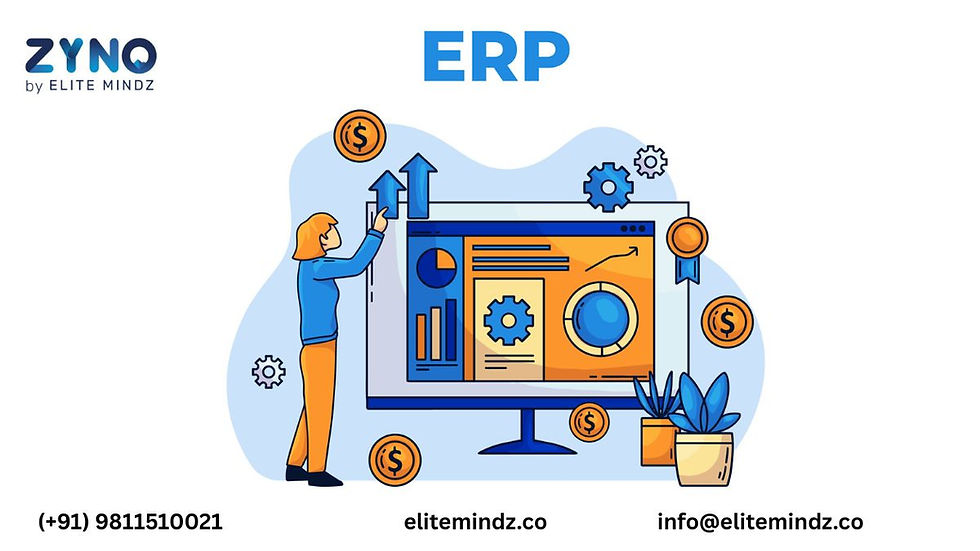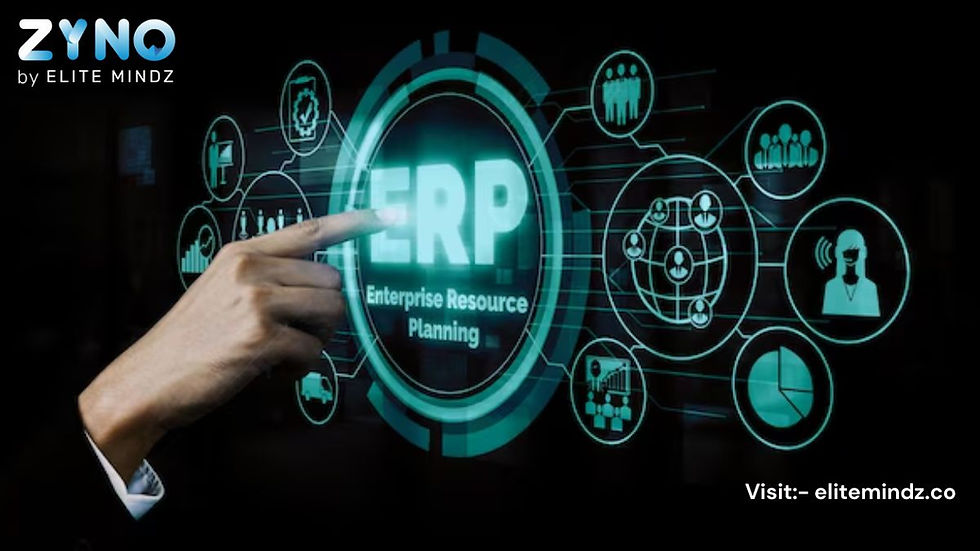How ERP Systems Are Transforming Shop Floor Operations in 2025
- priya elitemindz
- Jun 5, 2025
- 4 min read
The manufacturing sector is no longer about just machines and manpower — it’s about precision, real-time intelligence, and interconnected systems. Today’s competitive manufacturers, especially in India, are turning toward ERP (Enterprise Resource Planning) systems to digitize and optimize their shop floor operations.

This blog dives into how ERP transforms production, what technologies are involved, and why cloud-based ERP systems are shaping the future of Indian manufacturing — from SMEs to large-scale industries.
1. What Is the Shop Floor and Why Does It Matter?
The shop floor is the heartbeat of manufacturing — it’s where raw materials become finished goods. It’s home to:
Machines & equipment
Production lines
Assembly teams
Quality control stations
Work orders in execution
Issues like production delays, misallocated labor, and inaccurate inventory can seriously affect delivery timelines and profitability. And this is where ERP systems bring clarity, automation, and control.
2. Traditional Challenges on the Shop Floor
Without ERP, shop floor management is usually fragmented and error-prone:
Lack of visibility into real-time production data
Disconnected systems (e.g., inventory vs. scheduling)
Manual reporting and tracking
Delayed decision-making
Overproduction or underutilization of resources
These problems are especially harmful in fast-paced manufacturing hubs like India, where real-time agility is now expected.
3. Core Ways ERP Transforms Shop Floor Operations
A. Real-Time Production Monitoring
ERP software connects machines, sensors (via IoT), and human input to provide:
Live work order progress
Machine utilization data
Downtime alerts
Shift-wise performance analytics
This transforms decision-making from reactive to proactive.
B. Integrated Inventory & BOM Management
ERP systems eliminate guesswork by:
Mapping Bill of Materials (BOM) to current stock
Triggering auto-purchase of low-stock items
Aligning warehouse movement with job orders
Reducing wastage and scrap
C. Shop Floor Scheduling
Dynamic scheduling based on:
Machine availability
Skill-level of operators
Order priority
Maintenance windows
You get optimized work orders, reduced changeovers, and balanced workloads.
D. Quality Control Integration
ERP integrates quality checks into production steps:
Auto-flag defects with reasons
Capture inspection reports
Enable traceability by lot/batch
Generate NCRs (Non-Conformance Reports) automatically
It ensures industry compliance (like ISO, BIS) and customer satisfaction.
E. Maintenance Management
With preventive maintenance modules, ERP can:
Track machine life cycles
Alert on scheduled maintenance
Reduce breakdowns
Log maintenance costs and KPIs
This reduces unplanned downtime significantly.
F. Workforce Tracking
Shop floor ERP tracks:
Operator attendance
Overtime vs. productivity
Job-wise labor efficiency
Skill-matrix alignment
You can deploy the right people at the right task.
4. The Role of Cloud-Based Manufacturing ERP in 2025
Cloud-based manufacturing ERP offers:
No server costs
24/7 mobile access
Real-time collaboration
Automatic backups and updates
Security via role-based access
It’s a game-changer, especially for:
Multi-location units
Remote work coordination
Rapidly scaling SMEs
Businesses with minimal IT teams
Top Indian SMEs are adopting Elite Mindz Cloud ERP, SAP Business One Cloud, Zoho ERP, and ERPNext Cloud.
5. Use Cases: Real-World Examples
Steel Fabrication Company (Ahmedabad)
Problem: Inventory discrepancies and raw material wastage
Solution: Cloud ERP with RFID-based tracking and production planning
Result: 18% cost savings, 22% drop in material wastage
SME Electronics Manufacturer (Bangalore)
Problem: Manual job cards, delayed deliveries
Solution: ERP with automated job order creation and live shop floor dashboard
Result: 30% faster turnaround time, improved on-time delivery to 95%
Result: 30% faster turnaround time, improved on-time delivery to 95
6. Custom ERP vs Off-the-Shelf ERP for Shop Floor | ||
Criteria | Custom ERP | Off-the-Shelf ERP |
Cost | Higher upfront | Lower initial investment |
Deployment Time | 6–12 months | 4–6 weeks |
Flexibility | Fully tailored | Pre-defined modules |
Upgrades | Manual development needed | Automatic (in Cloud) |
For most Indian manufacturers, off-the-shelf, customizable cloud ERP is the sweet spot.
7. Best ERP Software for Manufacturing in India – 2025
ERP Solution | Ideal For | Key Feature |
Elite Mindz ERP | Small-to-mid manufacturers | AI, customizable workflows, unlimited users |
SAP Business One | Mid to large enterprises | Advanced production & finance integration |
Oracle NetSuite | Global setups | Cloud-native with international compliance |
ERPNext | Budget-conscious setups | Open-source with modular control |
Zoho ERP | Growing startups | Cloud + CRM + Finance integrated |
Conclusion
Shop floor operations are no longer isolated from the digital enterprise. With the power of ERP systems, especially cloud-based solutions, manufacturers can embrace a future of smarter workflows, higher productivity, and real-time decision-making.

Whether you're a small manufacturer in Noida or a steel producer in Pune — the right ERP can transform your floor into a factory of the future.
Frequently Asked Questions (FAQs)
Q1. What does ERP stand for in manufacturing?
ERP stands for Enterprise Resource Planning. It integrates core business operations like inventory, production,HR, sales CRM, and finance into a single software system.
Q2. How does ERP help with shop floor efficiency?
ERP provides real-time tracking, automated workflows, quality checks, maintenance schedules, and resource optimization, reducing manual errors and increasing productivity.
Q3. Why is cloud-based ERP better for manufacturers in 2025?
Cloud ERP allows real-time access, lower hardware costs, faster deployments, and automatic updates — ideal for scaling manufacturers across India.
Q4. Which ERP software is best for small manufacturers?
Elite Mindz ERP, ERPNext, and Zoho ERP are excellent cloud-based options that offer flexibility, affordability, and user-friendly interfaces for SMEs.
Q5. Can ERP systems be integrated with machines on the shop floor?
Yes, modern ERP platforms can be integrated with PLCs, IoT sensors, and SCADA systems to enable real-time machine monitoring and smart automation..




Comments